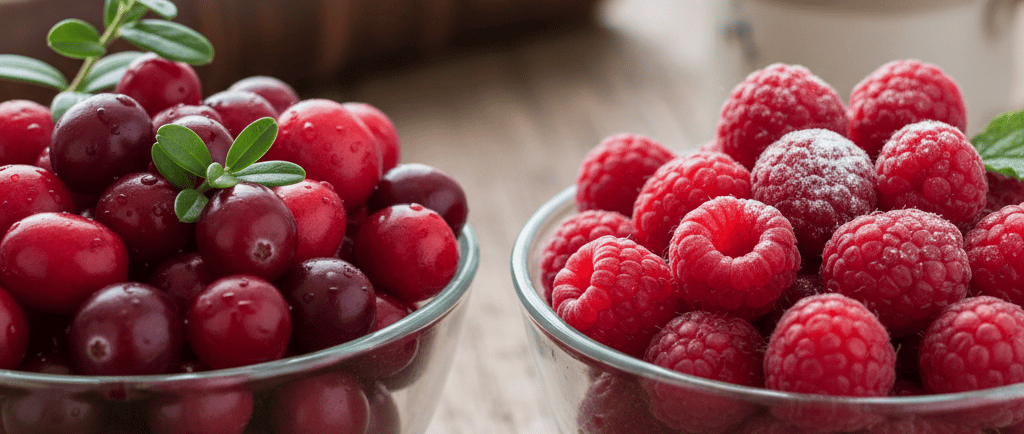Cranberry and Raspberry: A Tale of Two Berries
This article explores the origins, shared benefits, and distinct health advantages of cranberries and raspberries, highlighting their unique contributions to wellness.
WEIGHT MANAGEMENTPROCESSINGCRANBERRIESSEASONAL RECIPEFRESH CRANBERRYCRANBERRY HEALTH BENEFITSIMMUNE SYSTEMWEIGHT LOSSENVIRONMENTSUPER FOODMETABOLISMCRANBERRYCRANBERRY JUICEDRIED CRANBERRYRASPBERRY
9/25/20252 min read


Cranberry and Raspberry: A Tale of Two Berries
Cranberries and raspberries, two popular berries often found side-by-side in grocery aisles, boast vibrant colors, tart-sweet flavors, and a wealth of health benefits. While both are celebrated for their nutritional value, they have distinct origins, unique characteristics, and offer different advantages to our well-being.
Origins: A Journey Through Continents
The cranberry (genus Vaccinium) is a native of North America. Indigenous peoples have utilized cranberries for centuries, not just as food but also for medicinal purposes and as a dye. The small, round, crimson berries thrive in bogs and wetlands, typically harvested in the fall. Early European settlers quickly recognized their value, and cranberries played a significant role in early American cuisine and traditional remedies.
The raspberry (genus Rubus idaeus), on the other hand, has a more widespread global origin, with varieties found in Europe, Asia, and North America. European red raspberries are thought to have originated in Turkey and were cultivated by the Romans. Black raspberries, a distinct species, are native to North America. Unlike cranberries, raspberries typically grow on canes in more temperate climates and are often harvested in summer.
Similarities: A Berry Good Foundation
Despite their different backgrounds, cranberries and raspberries share several fundamental similarities that make them nutritional powerhouses:
Rich in Antioxidants: Both berries are bursting with antioxidants, compounds that protect our cells from damage caused by free radicals. This can contribute to reducing the risk of chronic diseases and combating inflammation.
Good Source of Fiber: Fiber is crucial for digestive health, helping to regulate blood sugar levels and promote a feeling of fullness. Both berries provide a healthy dose of dietary fiber.
Vitamin C Powerhouses: Essential for immune function, skin health, and collagen production, Vitamin C is abundant in both cranberries and raspberries.
Low in Calories: Both berries are relatively low in calories, making them excellent additions to a balanced diet for weight management.
Differentiates: Unique Health Benefits
While they share common ground, cranberries and raspberries offer distinct health advantages:
Cranberries:
Urinary Tract Health: This is perhaps the most well-known benefit of cranberries. They contain unique compounds called proanthocyanidins (PACs) that prevent bacteria, particularly E. coli, from adhering to the walls of the urinary tract. This makes them highly effective in preventing and managing urinary tract infections (UTIs).
Oral Health: Similar to their effect on the urinary tract, PACs in cranberries can also inhibit bacteria from sticking to teeth, potentially reducing plaque formation and the risk of gum disease.
Stomach Health: Research suggests cranberries may help prevent certain types of stomach ulcers by inhibiting the growth of Helicobacter pylori bacteria.
Raspberries:
Ellagic Acid Content: Raspberries are exceptionally rich in ellagic acid, a potent antioxidant and anti-inflammatory compound. Studies suggest ellagic acid may have anti-cancer properties, helping to inhibit the growth of certain cancer cells.
Anthocyanins: While both berries contain anthocyanins (the pigments that give them their color), raspberries, especially black raspberries, are particularly high in specific types of anthocyanins that have been linked to improved cardiovascular health and reduced inflammation.
Manganese Source: Raspberries are a good source of manganese, a trace mineral essential for bone health, metabolism, and antioxidant defense.
Conclusion
Both cranberries and raspberries are nutritional stars, offering a delicious way to boost your health. Cranberries shine in their ability to support urinary and oral health, primarily due to their unique PACs. Raspberries, on the other hand, stand out with their high ellagic acid content and diverse anthocyanins, potentially offering stronger anti-cancer and cardiovascular benefits. Incorporating a variety of berries into your diet is the best approach to harness the broad spectrum of nutrients and protective compounds they offer.
Here's an illustration of these two healthy berries!
Cranberry Expert
The no.1 cranberry producer in the world
© 2024. All rights reserved.
